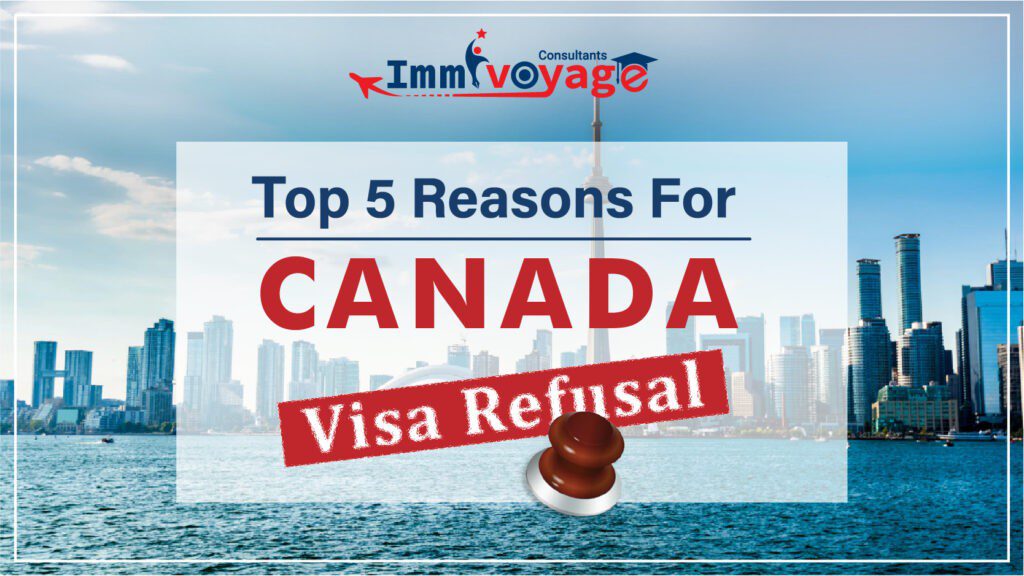Many aspirants cannot turn their dreams into reality because of visa refusal and rejection. The most common reason for visa denial is a lack of documentation or information demonstrating the applicant’s ability to visit the desired country. Visa refusal and visa rejection both lowers applicants’ enthusiasm and limit their chances of receiving a visa in the future.
It is often seen in some countries that visa refusal and rejection aren’t the same. Many people wonder is visa rejection the same as refusal? Are they the same? If not, then what’s the difference between the two? Let’s find out.
What is Visa Refusal?
The act of refusing access to a nation by rejecting an applicant’s visa application is known as visa refusal. If you faced visa refusal, you failed to satisfy the consular officer that you were eligible for a visa. It usually occurs when an application is unable to disclose critical information or misses a required document.
If the applicant cannot demonstrate that they have the required funds in their bank account, they can face visa refusal. Other reasons for visa refusal include incomplete applications, missing documents, and omitting essential information.
Reasons for Visa Refusal
Apart from the reasons listed above, your destination country’s immigration office may refuse your visa for various other reasons. The following are some of the significant reasons that may harm your visa application and result in visa refusal:
Inadequate English Proficiency
Applicants must meet all English proficiency exam requirements, as it is the most common reason for denial. They can meet either IELTS/PTE/CELPIP or TOEFL standards. If a student fails to complete the program’s standards and has a low score, they may be denied a student visa.
Seeking Advice from Fake Agent
These days, there are a lot of agencies that guarantee visas to hopeful applicants but are scammers. Scams will occur because of their offers of bundles and bargains. Such agents are only interested in making quick cash while wreaking havoc on the lives of their unsuspecting victims. They are one of the most typical reasons for visa denials and delays. As a result, you must proceed with extreme caution when choosing immigration counselors and beware of fake ones.
Providing Fraudulent Documents
A visa will be denied if you provide fabricated or false documents. Upon receiving your application, the visa authorities will perform a thorough assessment to ensure that your document is genuine. The application will be rejected if the document is found to be falsified, and you may be prevented from applying for a while.
What is Visa Rejection?
Visa rejection becomes the tag for an application returned to the applicant after failing to reach the decision-making stage. In most situations, the authorities will give you visa rejection reasons.
These reasons may help you avoid making the same mistake in future visa applications. You must reapply if the explanation is due to minor technical issues in the application. One of the visas that get denied easily is the F1 visa.
Why is Your Visa Being Denied?
It’s heartbreaking to spend many hours and effort trying to obtain a visa only to be denied. Whatever the cause for the visa denial, it not only puts an end to your plans to visit your destination country but also significantly impacts your future travel plans. So, what can be done to prevent this from happening? Here is a list of some of the most frequent reasons for visa denial so you can proceed with caution when applying for your visa.
Inconsistencies in Travel Documents:
You may be denied a visa if you submit an expired or tampered passport or a passport with less to no blank pages. Aside from that, many countries have distinct passport requirements for applicants. Your visa will be rejected if it does not match their requirements.
Late Submission of an Application
If you submit a late application with the embassy, your visa will likely be rejected. In many circumstances, the embassy will also emphasize limits about how many days before your departure date you can apply. For example, if the embassy recommends a 15-day processing time for a visa and you apply only seven days before your anticipated travel date, your application will likely be denied.
Application Form Is Incomplete
Your application will be denied if you’ve left a column on the application form blank. Every field on the application form contains a critical question. Even if a question does not apply to you, the form will prompt you to put ‘N/A’ or something else acceptable. Incorrect information on the application form can also result in a visa denial. So, check that your application form is complete before submitting it.
Past Criminal Records
If you have been convicted of a criminal offense, you are considered a threat to the destination country. As a result, your application will almost always be refused. If you have a clean criminal record, you will not have any issues with getting a visa.
Information Misalignment
Your application can be rejected if any of the information on the application form does not tally with the information on your travel documents. When people fill out forms quickly, this is a regular occurrence. Check to see if the information on the application form matches what’s in your passport. For example, even if your name is “Mugdha,” it appears on your passport and other documents as “Mughda,” you must use “Mughda” on your application form.
What is the Difference Between Visa Refusal and Visa Rejection
A visa refusal is when the visa application is not approved due to an applicant not meeting some of the requirements or not proving a particular case in the best interest. This might happen in a case where the applicant’s documents are not complete, or they have not fulfilled the necessary criteria.
On the other hand, visa rejection simply means when an application is rejected on different grounds concerning either the eligibility or suitability of the applicant—for instance, in cases where one has a criminal record or is unable to prove the intention behind the visit.
While refusal essentially involves one not meeting the basic criteria, rejection usually denotes the presence of serious issues or concerns that have compelled one to deny the issuance of a visa. Let’s understand the reason behind Visa refusal and rejection in detail.
Frequently Asked Questions About Visa Refusal and Visa Rejection
By now you must have understood the difference between visa refusal and rejection. However, there might be a few questions that must be coming to your mind. We have tried answering these questions below for a better understanding of visa refusal and rejection.
If my visa is rejected, can I apply again?
Yes, if your visa application has been rejected, you can re-apply after some time or even file a lawsuit against visa rejection.
Does visa Refusal affect my future applications?
Yes, remark of your visa refusal will result in strict background check and high scrutiny. When you reapply, those areas will be checked thoroughly that lead to your previous rejection.
How long after a visa refusal can I apply?
In most cases, you can reapply for your visa after 6 months of gap. However, it may differ by country and the type of visa you’re applying for.
What is the most common reason for visa rejection?
The most common reason for rejection of visa is incomplete and inconsistent application form. Student visas are the most rejected visa of them all.
How do I overcome a 214(b)-visa rejection?
There is no appeal in the case of a Section 214(b) refusal. This means that even if the consular officer has made an error or you later obtain new evidence establishing that you meet the visa qualifications and indeed intend to leave the U.S. after your visit, you must file another visa application.
Do embassies know about visa refusal in other countries?
Yes, these organizational bodies have a connected network where all the information about visa refusal is recorded.
Can you appeal against being refused a visa?
The right to appeal against a visa refusal varies by nation and is determined by the cause for your visa’s denial in the first place. If you live outside the United Kingdom (UK) and go for Indian visa refusal appeal, you will not be able to appeal a visa refusal. You can, however, request a review by the administration, in which case another officer will examine your visa application form. If you live in the United Kingdom, you can appeal a visa refusal.
Bottom Line
You must submit your visa application with the highest level of correctness and authenticity. Any failure to do so could have serious consequences, including your inability to visit your favorite destinations. To make sure that you don’t face visa refusal or rejection, reach out to Immivoyage, a visa expert in Mohali. Feel free to contact today!!



